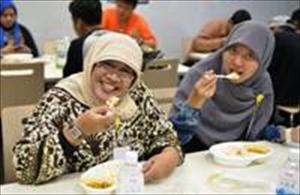(Ahlul Bayt News Agency) - “Halal foods are currently delivered only within the 23 wards of Tokyo, but we want to expand the delivery area,” a member of the Halal Deli’s staff told The Japan Times on Friday, June 21.
Halal Deli is one of new restaurants in Tokyo that opened recently to meet a growing demand for halal food from Muslim tourists from neighboring Indonesia and other Muslim countries.
The halal restaurants supply Malaysian, Indonesian and Turkish food.
Their most frequent customers are companies that have Muslim employees and visitors as well as tourists.
The Japanese government recently made tourism from Southeast Asia a priority and is preparing to relax visa requirements to lure more people from the region.
The remarkable change comes as new studies revealed that the number of Muslims worldwide is expected to exceed two billion in 2030.
“In our primary plan, we estimated about 200 orders monthly, but now we receive over 500 per month,” says the staff member at Halal Deli.
“We plan to get more contracts and we hope the service will eventually be expanded to other cities.”
The concept of halal, -- meaning permissible in Arabic -- has traditionally been applied to food.
Muslims should only eat meat from livestock slaughtered by a sharp knife from their necks, and the name of Allah, the Arabic word for God, must be mentioned.
Muslims do not eat pork and consider pigs and their meat filthy and unhealthy to eat. Alcohol is also totally forbidden for Muslims.
Now other goods and services can also be certified as halal, including cosmetics, clothing, pharmaceuticals and financial services.
Before halal food expansions, Fauziah Fauzan, an Indonesian Muslim, had to worry about the food served in restaurants and if it was permissible according to Islamic faith.
To avoid predicament, she had to resort to fish or strictly vegetarian meals.
“I didn’t have to worry if what I was eating was allowed or not,” said Fauzan, 42, a member of a group of about 30 education officials from Indonesia who came to Japan to visit schools.
“It would be great if halal foods were available in other areas.”
The Japanese government efforts to ease access to halal food guaranteed a growing share of Muslim tourism.
“There are many Muslims who would like to visit Japan, but the concern about the food is the main reason why they have second thoughts,” said Mina Hattori, the leader of Fauzan team and an associate professor at the School of Education and Human Development of Nagoya University.
“I think that if halal became more available, the number of Muslims visiting Japan would increase.”
Islam began in Japan in 1920s through the immigration of a few hundreds of Turkish Muslims from Russia following the Russian revolution.
In 1930, Muslims number reached about 1000 of different origins.
Another wave of migrants who boosted the Muslim population reached its peak in 1980s, along with migrant workers from Iran, Pakistan and Bangladesh.
Japan today is home for a thriving Muslim community of about 120,000 Muslim, among nearly 127 million in the world's tenth most populated country.
End item/ 149

